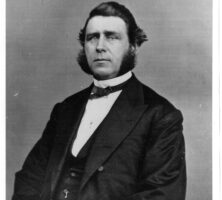Hopkins Holsey, a lawyer, writer, congressman, and journalist, planned to make politics a career, but the sudden death of his wife, along with political changes caused by high tariffs, nullification laws, and threats of secession in the Old South, changed all of that.

Hopkins was the second of five children born to Susannah Ingram and James Holsey of Brunswick County, Virginia. He was probably born in 1799. In 1806 the Holseys sold their Virginia lands and migrated to Hancock County, Georgia. Hopkins’s father died there in 1816, leaving the operation of his large plantation to his wife and two older sons, Gideon and Hopkins.
In 1819 Holsey entered law school in Litchfield, Connecticut, and upon his return to Georgia established a law practice and entered local politics. In 1826 he married Elizabeth Blake Mitchell of Jones County. The Holseys and Mitchells moved to Harris County, where in 1835 Holsey was appointed to James C. Terrell’s unexpired term in the U.S. Congress.
In 1835 Holsey, a Union Democrat, was elected to the 24th Congress. This Congress dealt with relief for the Revolutionary soldiers, removal of the Indians to the West, and the abolition of slavery in the District of Columbia. There was also the approaching war between Texas and Mexico. The United States hoped to remain neutral, but men from all over the country volunteered to fight.
The Holseys were returning to Georgia from Washington, D.C., when their son, Julius Hopkins Holsey, was born in the summer of 1836, near Charlotte, North Carolina. Holsey returned to Washington alone for the changing of presidential administrations from Andrew Jackson to Martin Van Buren. Receiving news that his wife was gravely ill, he started for Georgia, but she died in April 1837 before he could reach her. Holsey was devastated.
The 25th Congress had to contend with the unpopular Indian war in Florida, and at the convention of 1838, the entire Union Party, with the exception of George W. Towns, withheld their names for reelection. Southern politics had changed; thus Holsey’s political career for the most part was over.
In 1838 Holsey moved to Athens, where he bought a farm and he tried to put his life together and get acquainted with his only child. He remained active in politics, and in 1846 he bought the Southern Banner. It was during this time that an assassination attempt, the “Tugalo Tragedy ,” was made against Holsey. On September 26, 1850, he married Julia Neisler, the daughter of Hugh Neisler.
After an unsuccessful race for Congress in 1852, the Holseys left Athens for Taylor County, where Hopkins opened a law practice. He died there March 31, 1859, and was buried on his estate, Bright Water. A right-of-way to the graves was reserved when the property was sold, but no vestige of the grave site remains today.






